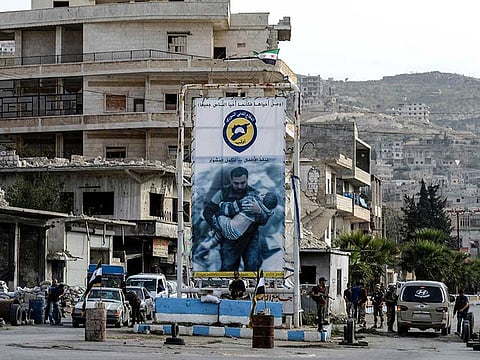‘No extremists seen exiting Syria buffer zone’
Rebels fire mortar shells at regime troops as Idlib zone withdrawal deadline ends Monday

Beirut- Hardline fighters have yet to begin withdrawing from a planned buffer zone in northwestern Syria, a monitor and an AFP correspondent said Sunday on the eve of the pullout’s deadline.
Regime ally Russia and rebel backer Turkey agreed last month to set up a demilitarised zone around the northwestern region of Idlib to prevent a bloody regime assault on the region.
Rebels also fired mortar shells from the planned buffer zone, the Britain-based Syrian Observatory for Human Rights monitoring group said Sunday.
The war monitor said rebels in the planned zone fired several “mortar shells at an army position in nearby Hama province killing two soldiers”.
Under the deal the horseshoe-shaped area was to be free of heavy arms by October 10 with “radical fighters” pulling out by Monday.
While the deadline for withdrawing heavy weapons was met on time, there has been no indication that the second condition is being implemented.
“We have not monitored any withdrawals by extremist fighters at all from areas falling in the planned buffer zone,” said the Observatory.
An AFP correspondent in Idlib also said no hardline factions had moved any of their units in recent days.
Idlib and surrounding rebel zones are held by a complex array of factions.
Less than half is controlled by the Ankara-backed National Liberation Front (NLF), the main rebel conglomerate there.
But the lion’s share is held by Hayat Tahrir Al Sham (HTS), an alliance led by former Al Qaida members, as well as more hardline extremists like Hurras Al Deen and Ansar Al Islam.
Those fighters also control more than two-thirds of the planned buffer zone and are supposed to leave it by Monday.
Hurras Al Deen has publicly rejected the agreement.
HTS, widely considered the most powerful force in the area, has not publicly commented on the accord but quietly abided by its first deadline and re-stationed its heavy arms elsewhere.
Observers have said that getting it to execute the deal’s second half would be much more challenging.
In a recent report for the Turkey-based Omran Centre, expert Nawar Oliver described HTS’s approval as the deal’s ultimate “test”.
“If HTS acts as a spoiler to the agreement on the ground, this will probably lead to one of two scenarios: either Turkey and the NLF launch military action against HTS, or Russia will seize the opportunity with the support of the regime and its allies to enter Idlib,” he said.
“The ramifications of that move could be vast,” he added.
Analysts say the HTS alliance could splinter if it decides to confront Turkish troops or the thousands of Turkey-backed opposition fighters, with whom it has clashed before.
Ahmad Al Ahmad, who heads the opposition’s Syria Press centre, said Syrian members of the Al Qaida-linked group are not looking for confrontation with Turkey and its allies.
Al Ahmad said the group’s leader, Abu Mohammad Al Golani, and the Syrian members are close to the Turkish side, while the foreign fighters are opposed to the deal.
Abu Yaqzan Al Masri, an Egyptian religious judge affiliated with the Al Qaida-linked group, warned against the rebels giving up their weapons after the Russia-Turkey deal was reached. He said the group’s opponents will attempt to spark infighting to rid the area of extremists and preserve the deal.
“It is clear that there will be a confrontation eventually because (extremist factions) are not the type of groups who surrender easily,” said Bassam Haji Mustafa, a senior official with the Turkey-backed Nour Al Deen Al Zinki, one of 15 that form the National Liberation Front. He added that most people in Idlib support moderate rebel groups backed by Turkey and some Western nations.
Turkish presidential spokesman Ebrahim Kalin signalled on September 20 for the first time that if necessary, Turkey may use military action to remove the Levant Liberation Committee from the Idlib demilitarised zone in coordination with Russia
Meanwhile, on Friday, the regime’s army warned residents of Idlib to stay away from jihadists, who have yet to withdraw from a buffer zone.
Residents in the area received warning messages on their mobile phones from the Syrian army early Friday, an AFP correspondent said. “Get away from the fighters. Their fate is sealed and near,” one said.
“Don’t allow the terrorists to take you as human shields,” said another, addressed to residents of the planned buffer zone.
The UN’s World Food Programme’s Executive Director David Beasley said the organisation was preparing for a vast new wave of refugees likely to flee to Turkey if conflict breaks out in Idlib region.
Beasley said the WFP is “pre-positioning rations for short term, middle range, along the Turkish border.”
He said the WFP is working with Turkish, Russian, Syrian, US and other officials “to do what we can to minimise the impact when a war truly goes into full scale mode there.”
Over 10 million people in Syria suffer from hunger or are at risk of it. Turkey is already struggling to cope with some 3 million people who fled the war.
In Brussels for talks with senior European Union officials, Beasley said the bloc and its international partners could save both lives and money by helping to meet people’s food needs now.
“It costs us about 50 cents per day to feed a Syrian inside Syria,” he said. “But to support that same Syrian in Berlin or Brussels on humanitarian support is 50 euros ($58).”
“The Syrian wants to be home and so anything we can do to address food security is a win-win for everybody,” Beasley added.



